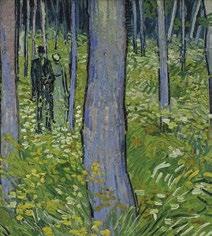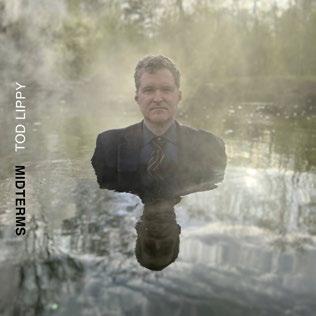
7 minute read
"TOWARDS HAPPINESS" - LITERARY SPOTLIGHT
“Towards Happiness offers a series of true-to-life stories about real people and follows their literal pursuit of happiness. Their trials and travails offer guidance by example. The stories follow the protagonists as they try, make mistakes, brush themselves off, try again…there is a sense of real life, as well as of real drama. But more to the point, anyone can learn from these relatable, immensely human accounts. The lessons are ones that you can actually use because you see how each lesson was learned.” Arnold Richards, M.D., Founding Editor, International Psychoanalysis
“In Towards Happiness, Dr. Friedberg has made an incredibly sensitive study of actual lived experience. In this collection of intimate portraits, he demonstrates the imagination, courage, wisdom, and unflagging effort necessary to create happiness where it has been lost.” Harold Bronheim, M.D., Clinical Professor of Psychiatry, Icahn School of Medicine, Mt. Sinai
Advertisement
Drawing on a range of clinical cases, Towards Happiness presents an engaging, insightful look at how we define and achieve happiness in core aspects of our lives: work and money, wellness and personal growth, sex and love, family and friendship, and aging.
The book includes a series of essays by Dr. Ahron Friedberg, a prominent Manhattan psychiatrist, concerning how his patients sought to achieve greater happiness during challenging periods of their lives, and how as a consequence they grew personally and professionally. Each chapter considers a core topic through the lens of Dr. Friedberg’s practice, demonstrating how patients worked through difficult, sometimes chronic personal issues. Throughout, there are useful summaries of key points. While candidly acknowledging that each life is different, Towards Happiness offers practical examples that can enhance readers’ efforts to achieve greater levels of happiness and reorient their lives towards a deeper capacity for happiness.
Towards Happiness offers honest insights into the compromises, sacrifices, and resulting degrees of success that characterize pursuing happiness, and will be of great interest to psychoanalysts, clinical psychologists, and other mental health professionals. It will also be useful reading for anyone seeking to understand the achievement of happiness in their own lives.
Ahron Friedberg, M.D., Clinical Professor of Psychiatry, Mount Sinai School of Medicine. Editor, The Academy Forum of the American Academy of Psychodynamic Psychiatry and Psychoanalysis. Book Editor, Psychodynamic Psychiatry. Co-Chair, International Council of Editors of Psychoanalytic Journals. Served twice as National President of the American Society of Psychoanalytic Physicians. Recent books include Psychotherapy and Personal Change: Two Minds in a Mirror (Routledge 2021) and Through a Screen Darkly: Psychoanalytic Reflections During the Pandemic (Routledge 2021).
Sandra Sherman, J.D., Ph.D., formerly a Senior Attorney in the U.S. government and Professor of English at two major universities. Currently, a Principal at ChildsPlay International, an organization that helps children around the world to realize the benefits of play. She is the author of four books on cultural history, and co-author of several books on neuroscience, as well as co-author with Dr. Friedberg of Psychotherapy and Personal Change and Through a Screen Darkly.
PSYCHOANALYSIS / SELF DEVELOPMENT
Routledge titles are available as eBook editions in a range of digital formats ISBN 978-1-03-227627-4
9 781032 276274
TOWARDS HAPPINESS— A PSYCHOANALYTIC APPROACH TO FINDING YOUR WAY
Ahron Friedberg, M.D. with Sandra Sherman
TOWARDS HAPPINESS— A PSYCHOANALYTIC APPROACH TO FINDING YOUR WAY
Ahron Friedberg, M.D. with Sandra Sherman
TOWARDS HAPPINESS –
FINDING HAPPINESS IN WORK
By Ahron Friedberg, M.D.
Ifind meaning in my work as a psychiatrist because I can follow the progress of the people whom I treat. Following their progress – often over several years – is a source of emotional feedback. It reinforces my sense that I chose the right profession, that is, one that calls on my need to be empathic, to listen, and help troubled individuals understand how to lead a more satisfying life.
The first essay in Towards Happiness, “The Context is Personal,” talks about how the happiness that work can provide is different from other kinds of happiness, for example, the kind we feel in a romantic relationship. It’s grounded in the knowledge that we are performing well and can feel good about what we’re doing. So, even if we are not happy in another aspect of our lives, work may be a source of healthy self-esteem.
Another essay, “The Right Fit,” examines the struggle of some people to find work that provides meaning and purpose. Sometimes we need to try several professions until something feels right. It’s normal. We shouldn’t resist the need to find satisfying work, since what we do profoundly affects how we feel about ourselves. We can’t be happy if we don’t care about our work or it just doesn’t feel like us, that is, if it doesn’t call on our talents and may conflict with our convictions. Another essay, “Retirement,” talks about a patient who retires without making provision for a continuing source of meaning and purpose. He flounders. The lesson is that throughout life, even when we have formally stopped working, we still need some attachment to an occupation that sustains our sense of self and our productive relationship to the world.
Of course, it’s important to earn a living. But in Towards Happiness, I take a somewhat different tack. That is, I argue that staying in a lucrative position only for the money can actually trip you up. It can make you feel awful.
The essay “Office Politics vs. Your Moral Compass” examines this effect. The point is that while we need to find work that pays, we should not lose sight of other considerations, such as whether we’re comfortable doing what we do and feel right about compromises that we’re called on to make. Actually, what we do affects us and the people around us. We can’t dissociate ourselves from the consequences.
Though we’ve all grown up with that famous line from The Godfather – “It’s not personal. It’s just business.” – the fact is that work is personal, and an extension of who we are in relation to others.
TOD LIPPY
BRINGS MUSIC WITH MIDTERMS
By Harry Brads
Tod Lippy, the polymath creative force behind the award-winning arts publication Esopus, recently released his latest musical project, Midterms, a six track EP following the recent release of the single “Bob” which features also on this project.
Midterms is the third album from Lippy following the wellreceived LPs Here We Are (2019) and Yearbook (2021), both produced by the legendary Kramer (Low, Galaxy 500).
The message behind the rest of Midterms EP is anything but vague: “This country is grappling with a dark period of hyperpolarization, distrust in institutions, and economic instability,” Lippy says. “Midterms is my attempt to come to terms with, and maybe even try to make some sense of, this reality.” The other songs on the album deal with issues ranging from toxic television personalities and celebrity culture to armchair activism and apathy in general.
For a preview of “Happy Ending” one of the tracks on the newly released Album please follow this link https://bit. ly/3nrX5kU
Acclaimed artist Steve Keene, perhaps best-known for his iconic album art for bands like Pavement, The Apples in Stereo, and Silver Jews, has painted a series of 7 different covers on 50 chipboard sleeves containing the forthcoming lathe-cut 10” vinyl release of “Midterms” (out in August). The paintings include Keene’s interpretations of the EP’s original cover in addition to 6 images corresponding to each track on the release.
Lippy has always been at the forefront of creating art that helps find meaning in life. Starting in 2003, he produced ESOPUS, the esteemed arts publication declared “a thing of lavish, eccentric beauty” by The New York Times. For his “one-man magazine,” Lippy handled all design, editing, publishing, distribution, and selection of/interaction with contributors, ranging from writers like Karl Ove Knausgaard and Francine Prose to art world superstars like Jenny Holzer, Marilyn Minter, Anish Kapoor, and Kerry James Marshall, from filmmakers such as actor Lisa Kudrow and director David Lynch to musicians and composers like Kimya Dawson, Sharon Van Etten, and Carter Burwell.

The work led to a partnership with several New York city institutions including MoMA, New York Public Library, The Kitchen, and National Sawdust to create performances, exhibitions, lectures, and other events. The nonprofit corporation formed to serve as the umbrella organization for all activities, The Esopus Foundation Ltd., received major funding from organizations ranging from the NEA to The Andy Warhol Foundation.
Lippy has also made a name for himself as a book designer (most recently creating the cover for Louis Menand’s critically acclaimed The Free World (FSG); artist (earning a coveted MacDowell Colony Residency in 2018 to complete a series of drawings related to his work on Esopus); curator (responsible for exhibitions at White Columns and Pioneer Works, among other venues); writer for Artforum and other publications; and filmmaker, whose 2000 short film Cookies played at 20 film festivals around the world.










